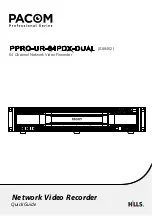
Route maps add to that redistribution capability by allowing you to match specific routes and set or change more attributes when
redistributing those routes.
In the following example, the
redistribute
command calls the route map
static ospf
to redistribute only certain static routes into
OSPF. According to the route map
static ospf
, only routes that have a next hop of Tengigabitethernet interface 1/1 and that have a
metric of 255 are redistributed into the OSPF backbone area.
NOTE:
When re-distributing routes using route-maps, you must create the route-map defined in the
redistribute
command
under the routing protocol. If you do not create a route-map, NO routes are redistributed.
Example of Calling a Route Map to Redistribute Specified Routes
router ospf 34
default-information originate metric-type 1
redistribute static metric 20 metric-type 2 tag 0 route-map staticospf
!
route-map staticospf permit 10
match interface TenGigabitEthernet 1/1
match metric 255
set level backbone
Configure a Route Map for Route Tagging
One method for identifying routes from different routing protocols is to assign a tag to routes from that protocol.
As the route enters a different routing domain, it is tagged. The tag is passed along with the route as it passes through different routing
protocols. You can use this tag when the route leaves a routing domain to redistribute those routes again. In the following example, the
redistribute ospf
command with a route map is used in ROUTER RIP mode to apply a tag of 34 to all internal OSPF routes that are
redistributed into RIP.
Example of the
redistribute
Command Using a Route Tag
!
router rip
redistribute ospf 34 metric 1 route-map torip
!
route-map torip permit 10
match route-type internal
set tag 34
!
Continue Clause
Normally, when a match is found, set clauses are executed, and the packet is then forwarded; no more route-map modules are processed.
If you configure the
continue
command at the end of a module, the next module (or a specified module) is processed even after a match
is found. The following example shows a continue clause at the end of a route-map module. In this example, if a match is found in the
route-map “test” module 10, module 30 is processed.
NOTE:
If you configure the continue clause without specifying a module, the next sequential module is
processed.
Example of Using the
continue
Clause in a Route Map
!
route-map test permit 10
match commu comm-list1
set community 1:1 1:2 1:3
set as-path prepend 1 2 3 4 5
continue 30!
Access Control Lists (ACLs)
119
Summary of Contents for S4048T-ON
Page 1: ...Dell Configuration Guide for the S4048 ON System 9 11 2 1 ...
Page 148: ...Figure 10 BFD Three Way Handshake State Changes 148 Bidirectional Forwarding Detection BFD ...
Page 251: ...Dell Control Plane Policing CoPP 251 ...
Page 363: ... RPM Synchronization GARP VLAN Registration Protocol GVRP 363 ...
Page 511: ...Figure 64 Inspecting the LAG Configuration Link Aggregation Control Protocol LACP 511 ...
Page 558: ...Figure 84 Configuring Interfaces for MSDP 558 Multicast Source Discovery Protocol MSDP ...
Page 559: ...Figure 85 Configuring OSPF and BGP for MSDP Multicast Source Discovery Protocol MSDP 559 ...
Page 564: ...Figure 88 MSDP Default Peer Scenario 2 564 Multicast Source Discovery Protocol MSDP ...
Page 565: ...Figure 89 MSDP Default Peer Scenario 3 Multicast Source Discovery Protocol MSDP 565 ...
Page 841: ...Figure 115 Single and Double Tag TPID Match Service Provider Bridging 841 ...
Page 842: ...Figure 116 Single and Double Tag First byte TPID Match 842 Service Provider Bridging ...
















































